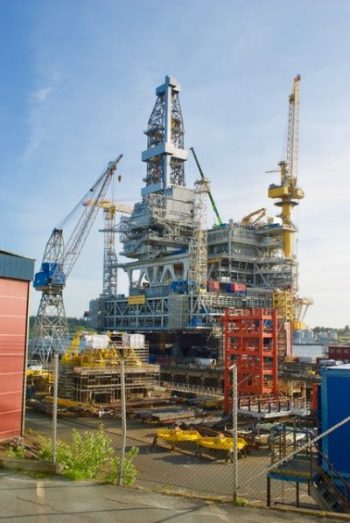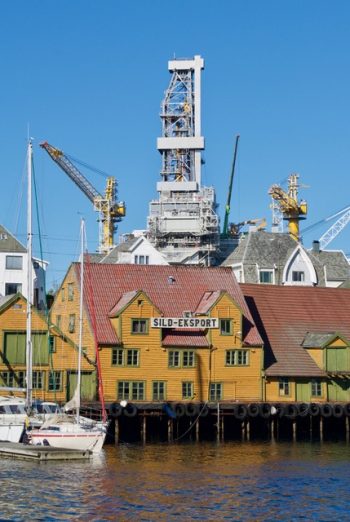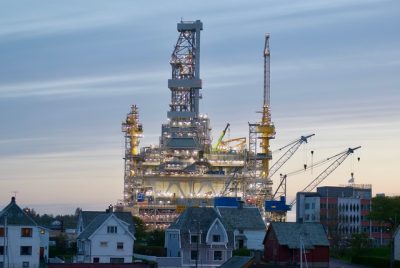With oil prices now up to around USD 80 a barrel for Norway’s North Sea crude, this brand-new drilling rig for the country’s state-controlled oil company is poised for what’s likely to be a festive tow-out to its new Johan Sverdrup oil field. Eldar Sætre, CEO of the former Statoil, referred to the profits now gushing in as a “fairy tale” for the company he heads that’s just been renamed “Equinor.”

The new name still wasn’t showing on the signs adorning the huge rig that’s being readied at the sprawling Aibel offshore yard in Haugesund. They read “JOHAN SVERDRUP – STATOIL,” erected before the company’s management and board decided they wanted to do away with references to both the state and oil.
The proposed name change stirred up opposition in Parliament, from the Labour and Center parties that objected to altering the identity of a company that’s contributed enormously to the country’s wealth. Since the state remains the company’s biggest owner, with a 67 percent shareholding, some top Labour and Center party politicians wanted to delay the name change until they could debate it in Parliament.
They ended up being in the minority, and even catching flak from the parliament’s committee in charge of energy and environmental issues. “The desire for the name change is based on business- and strategic considerations,” wrote the committee’s majority from the three conservative government parties plus the Christian Democrats and the Greens. “The competence to make such a decision lies with the company’s board and management. Challenging it would amount to political meddling … that’s not in line with the state’s principles for good ownership.”
Petro-kroner pouring in
Sætre thus prevailed in his ongoing efforts to bring Statoil in line with the times as he sees them, with more emphasis on lower costs and renewable energy in a world that’s ultimately likely to move away from fossil fuels. In the meantime, the sharp rise in oil prices over the past few months is getting the new “Equinor” off to a flying start within its core business. He opted to celebrate the name change with a visit to the Troll oil field located just 65 kilometers west of Bergen. It boasts three platforms and the highest production on the Norwegian Continental Shelf over the past four years.
“The field has delivered value of more than 2,000 billion kroner so far,” Sætre told newspaper Dagens Næringsliv (DN) during the recent long holiday weekend. “It’s possible that double that lies ahead of us. There’s almost an incomprehensible dimension over what we’re experiencing. It’s a fairy tale.”

The Johan Sverdrup field, located 140 kilometers west of Stavanger, is also expected to be big producer, with the new drilling rig from Haugesund to be positioned at the center of multiple oil platforms as well. And with oil prices topping USD 80 a barrel, fittingly enough on the country’s own national day on the 17th of May, both Troll and Sverdrup are turning into money machines.
DN reported that Equinor is now earning more money that it did when oil prices rose as high as USD 130 several years ago. That’s because of all the dramatic cost-cutting at the former Statoil, and a decision by Sætre to prepare the company for what was thought to be a new era of much lower oil prices.
“The upturn has come much more quickly and strongly than we had thought,” Sætre said. “We believed it would be a slower journey, towards USD 75 a barrel sometime in 2022.” Prices have instead jumped already, propelled by geopolitical situations including the political chaos in Venezuela and collapse of its oil production, and the threatened US sanctions against Iran. Demand for oil has also remained higher than expected and members of OPEC haven’t boosted production.
Sætre remains cautious, in the event the prices fall again. Some of Equinor’s fields can be profitable at prices well below USD 30 a barrel. The newly re-named state oil company thus continued to do well on the Oslo Stock Exchange last week, with DN noting that its share price is up nearly 50 percent over the past year.

The company continues to spark controversy, and not just over its name change. Its new still-male-dominated management team was harshly criticized as “embarrassing” when introduced earlier this month. Its 15 members include just three women, although one of them (Irene Rummelhoff, in charge renewable energy) has a management team of her own made up of 64 percent women.
Equinor also continues to be a target of ongoing criticism from environmental organizations unhappy about the company’s exploration activity in sensitive Arctic areas. Greenpeace Norge, which holds stock in Statoil/Equinor in order to have a vote at the annual general meeting, continues to demand a halt to all oil exploration in areas where the company’s licenses are under legal challenge in court. It predictably failed to muster support at last week’s gathering of shareholders, most of which are held by the state that Greenpeace has sued.
Greenpeace leader Truls Gulowsen also scoffed at Statoil’s name change to Equinor, calling it “same shit (in a) new wrapping.” He claimed that “Statoil removes oil from its name and says it will concentrate on renewables. At the same time they send drilling rigs to vulnerable and natural pearls both in Norway and other places in the world. If Statoil’s ambition is to become a greener company, it must cut out the worst oil projects in the Arctic and elsewhere.”
Sætre, after 38 years in the company, is accustomed to critics and prefers to stress wealth creation. What’s happening now “is the most profitable I’ve ever been part of,” he told DN. That, he thinks, is reason to cheer.
newsinenglish.no/Nina Berglund

